 Barnevelder
Barnevelder
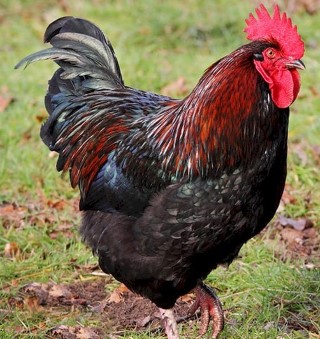 Barnevelder
chickens are named for the town of Barneveld in central Netherlands. They are
good layers of large brown eggs and, unlike some other breeds, continue to lie
well during winter.
Barnevelder
chickens are named for the town of Barneveld in central Netherlands. They are
good layers of large brown eggs and, unlike some other breeds, continue to lie
well during winter.In the 1850s Asian chickens began to arrive in Europe, where they were at first known as "Shanghai" chickens. These were initially cross-bred among them, and only later developed into breeds such as the Brahma, the Cochin and the Croad Liangshan. From about 1865, some of these Shanghai chickens were cross-bred with local farmyard chickens in the area of Barneveld. Towards the end of the nineteenth century there may also have been some breeding with a type called Amerikaanse Nuthoenders which served as utility birds that showed some si ...

 Bianca_di_Saluzzo
Bianca_di_Saluzzo
 In the verdant pastures of Piedmont, amidst a landscape steeped in tradition and agricultural heritage, the Bianca di Saluzzo chickens reign supreme as stalwart guardians of authenticity. Alongside their esteemed counterpart, the Bionda Piemontese, these noble breeds embody the essence of local pride and culinary excellence.
In the verdant pastures of Piedmont, amidst a landscape steeped in tradition and agricultural heritage, the Bianca di Saluzzo chickens reign supreme as stalwart guardians of authenticity. Alongside their esteemed counterpart, the Bionda Piemontese, these noble breeds embody the essence of local pride and culinary excellence.
Today, the Bianca di Saluzzo and Bionda Piemontese breeds, each boasting a lineage steeped in history, find themselves gracing the fields of Piedmont in modest numbers. Their revival and preservation owe much to the dedicated efforts of a select few agricultural high schools, whose unwavering commitment to tradition spurred them to embark on this noble endeavor back in 1999. Fueled by a passion for heritage a ...

 Bionda Piemontese
Bionda Piemontese
 The Piemontese chickens, with their rustic demeanor and robust constitution, stand as a testament to resilience in the face of adversity. Blessed with a rapid growth rate and a commendable meat production, these hardy creatures thrive in outdoor environments, embodying the spirit of freedom and vitality.
The Piemontese chickens, with their rustic demeanor and robust constitution, stand as a testament to resilience in the face of adversity. Blessed with a rapid growth rate and a commendable meat production, these hardy creatures thrive in outdoor environments, embodying the spirit of freedom and vitality.
At the age of 112 days, these chickens are deemed ripe for slaughter, although notable yields can also be achieved as early as 70 days, with an average weight of approximately 1.5 kg. Their meat, renowned for its quality and flavor, remains exceptional even when raised and fed extensively, a testament to their inherent excellence.
Yet, it is not only in their meat production that Piemontese chickens excel. Their laying ...

 Black Sex-Link
Black Sex-Link
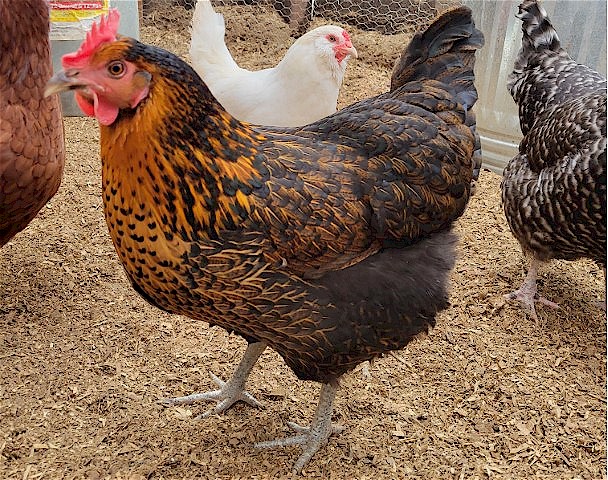 Black Sex-Link chickens are a hybrid breed developed from crossbreeding a Rhode Island Red rooster and a Rhode Island White or Delaware hen. This breed is called "sex-linked" because the male and female chicks can be distinguished by their color at hatch, making it easier for farmers to determine which birds to keep for meat and which birds to keep for egg production. The hens are known for their high egg production and the roosters are often used for meat production. These chickens are friendly, hardy and adaptable to different environments.
Black Sex-Link chickens are a hybrid breed developed from crossbreeding a Rhode Island Red rooster and a Rhode Island White or Delaware hen. This breed is called "sex-linked" because the male and female chicks can be distinguished by their color at hatch, making it easier for farmers to determine which birds to keep for meat and which birds to keep for egg production. The hens are known for their high egg production and the roosters are often used for meat production. These chickens are friendly, hardy and adaptable to different environments.
The Black Sex-Link chickens were developed in the 1950s as a result of crossbreeding between a Barred Plymouth Rock hen and a Rhode Island Red or New Hampshire Red rooster. This breed was de ...

 Booted Bantams
Booted Bantams
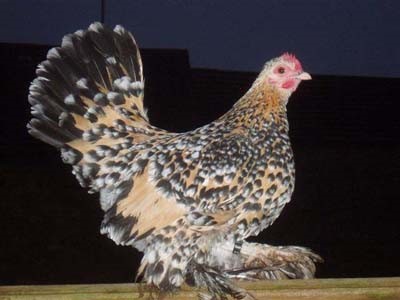 Booted Bantams
are ornamental chickens with over twenty different plumages; they often steal
the show in exhibition. They are small, easily tamed, hardy, and friendly; they
make good pets.
Booted Bantams
are ornamental chickens with over twenty different plumages; they often steal
the show in exhibition. They are small, easily tamed, hardy, and friendly; they
make good pets.
Booted Bantams are friendly, easily tamed, and easily handled. They like to forage in the garden for bugs and seed and do so without the damaging plants and soil as would other breeds. The hens brood a couple times a year. They make good mothers. Booted Bantams bear both individual and group confinement well. Small, clean, and entertaining they have all the qualifications for a good pet and show animal for enthusiasts.
They have a single comb with five point, red wattles, and matching earlobes. The most widely r ...

 Braekel
Braekel
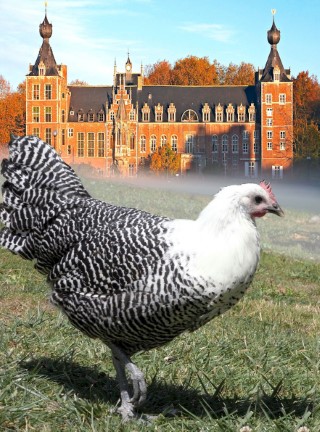 Braekel chickens
are one of the older European chicken breeds. Their history dates back to 1416.
They were even mentioned as a successful poultry breed of Belgium. There is a miniature
version of the Braekel.Two distinct types of Braekel were recognized in
the past: the large type living on rich clay soil Flanders, and a light-weight
type from the less fertile region, the Kempen. Due to crossbreeding between the
different types, this distinction vanished, resulting in a single type.
Braekel chickens
are one of the older European chicken breeds. Their history dates back to 1416.
They were even mentioned as a successful poultry breed of Belgium. There is a miniature
version of the Braekel.Two distinct types of Braekel were recognized in
the past: the large type living on rich clay soil Flanders, and a light-weight
type from the less fertile region, the Kempen. Due to crossbreeding between the
different types, this distinction vanished, resulting in a single type.
In the UK, USA, and Australia, however, one can still find descendants of the Kempische Brakel under its old name “Campine”. Campines has evolved differently from the Brakel.
Their most noticeable difference is the hen-feath ...

 Brahma
Brahma
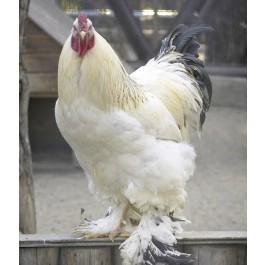 Brahma chickens are a large breed of chicken developed in the United States from very large birds imported from Shanghai. Brahma was the principal chicken used for meat in the US from the 1850s until about 1930.
Brahma chickens are a large breed of chicken developed in the United States from very large birds imported from Shanghai. Brahma was the principal chicken used for meat in the US from the 1850s until about 1930.There has been considerable controversy over the origin of the Brahma. It appears to have developed in the United States from birds imported from Shanghai. Limited cross-breeding with Chittagong chickens from Bangladesh is likely what gave the Brahma the distinctive characteristics of head shape and the pea comb that distinguish them from the Cochin (another breed that derives from comon ancestors).Brahmas were first exported to England in December 1852 when George Burnham sent nine "Gray Shanghaes" to Queen Victoria as a g ...

 Buckeye
Buckeye
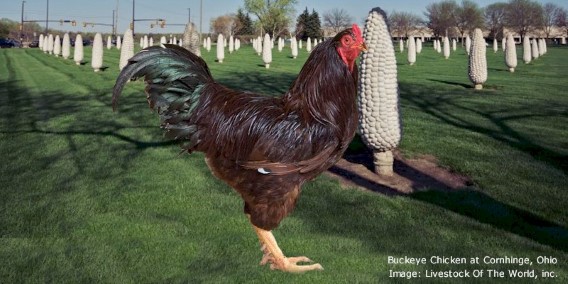 Buckeye chickens originating
in the U.S. state of Ohio. Ohio is known as "the Buckeye state";
which were they got their name. They were first bred and developed in 1896, by
a Warren, Ohio resident named Nettie Metcalf. Nettie Metcalf crossbred Barred
Plymouth Rocks, Buff Cochins, and some black breasted red games to produce the
Buckeye. Her goal was a functional breed that could produce well in the bitter
Midwest winters.
Buckeye chickens originating
in the U.S. state of Ohio. Ohio is known as "the Buckeye state";
which were they got their name. They were first bred and developed in 1896, by
a Warren, Ohio resident named Nettie Metcalf. Nettie Metcalf crossbred Barred
Plymouth Rocks, Buff Cochins, and some black breasted red games to produce the
Buckeye. Her goal was a functional breed that could produce well in the bitter
Midwest winters. Buckeye chickens are a calm dual-purpose chicken that have a decent laying ability (between 150 and 200 eggs per year) and strong meat production characteristics. Buckeyes are yellow skinned chickens that lay brown eggs. They are the only purely American chicken breed to sport a pea comb, and this, co ...
